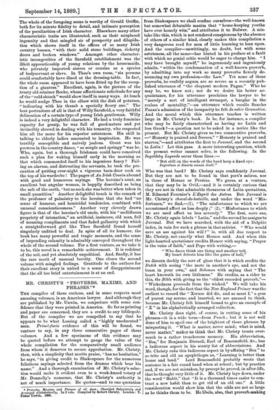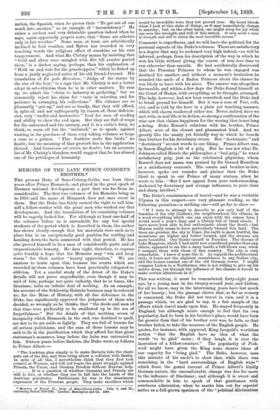MR. CHRISTY'S " PROVERBS, MAXIMS, AND PHRASES."*
THE compiler of these curious, and in some respects most amusing volumes, is an American lawyer. And although they are published by Mr. Unwin, we conjecture with some con- fidence that they were printed in America. So far as printing and paper are concerned, they are a credit to any bibliopole. But of the compiler we are compelled to say that he appears to be what Leasing called a "highly uneducated" man. Prinui -facie evidence of this will be found, we venture to say, in any three consecutive pages of these volumes. And a few specimens of this evidence may be quoted before we attempt to gauge the value of the whole compilation for the comparatively small audience from whom it deserves to secure approbation. Mr. Christy, then, with a simplicity that merits praise, "has no hesitation," he says, "in giving credit to Shakespeare for the numerous felicitous sayings selected from the dramas which bear his name." And a thorough examination of Mr. Christy's selec- tion would make it evident even to a weak-kneed votary of Mr. Donnelly's nonsense, that Mr. Christy's authority is not of much importance. He quotes—and to one quotation • Proverbs, Maxims, and Phrases of all Ages : Oiassifted Subjectively and Arranged Alphabetically. In 2 vole. Compiled by Robert Christy. London : T. Fisher Unwin. 1888. from Shakespeare we shall confine ourselves—the well-known but somewhat debatable maxim that " home-keeping youths have ever homely wits," and attributes it to Bulwer. A mis- take like this, which is not rendered conspicuous by the absence of others of a similar kind, clearly makes this compilation a. very dangerous reed for men of little learning to lean upon. And the compiler—unwittingly, no doubt, but with some astuteness, all the'same—has hinted in his preface at a fault with which no genial critic would be eager to charge him. " I may have brought myself," he ingenuously and ingeniously admits, " within the condemnation of a well-known proverb, by admitting into my work so many proverbs fiercely de- nouncing my own profession—the Law." Yet none of these proverbs, he craftily argues, are so severe as a recently pub- lished utterance of "the eloquent modern Pagan." Who he may be, we know not ; nor do we desire his better ac- quaintance, for his utterance proclaims the lawyer to be "merely a sort of intelligent strumpet, a burglar in the realms of mentality,"—an utterance which recalls Sancho Panza's admission of the incapacity he felt de saber Gramatica. And the moral which this utterance teaches is written large in Mr. Christy's book. Is he, for instance, a compiler who may be fairly characterised as having no Latin and less Greek ?—a question not to be asked in a notice like the present. But Mr. Christy gives us two consecutive proverbs, —" Honesty is praised and freezes," " Honesty is praised and starves,"—and attributes the first to Juvenal, and the second to Latin ! Let this pass. A more interesting question, which the present writer cannot solvei is the following. In the Ingoldsby Legends occur these lines :- " But still on the words of the bard keep a fixed eye : Ingratum si dizeris omnia dizti."
Who was that bard P Mr. Christy says confidently Juvenal. But they are not to be found in that poet's satires, nor in those of Horace or Persius. We guess, at a venture, that they may be in Ovid,—and it is certainly curious that they are not in that admirable thesaurus of Latin quotations, M. Edmond Fournier's L'Esprit des Autres. But Juvenal is Mr. Christy's cheval-de-bataille, and under the word " Mis- fortunes," we find,—(l), "The misfortunes to which we are accustomed affect us less deeply ;" (2), " Misfortunes to which we are used affect us less severely." The first, more sue, Mr. Christy again labels " Latin," and the second he assigns to Juvenal. But we have searched, with the aid of a Delphic index, in vain for such a phrase in that satirist. " Who would save an ass against his will ?" is, with all due respect to Mr. Christy, not exactly what Horace said. And when this light-hearted quotationer credits Homer with saying, "Prayer is the voice of faith," and Pope with writing,- " Who dares think one thing and another tell,
My heart detests him like the gates of hell,"
we discern darkly the sort of glass that it is which credits the Dutch with seeing " the mote in another's eye, and not the
beam in your own," and Solomon with saying that " The
heart knoweth its own littleness." He credits, as a rider to this, the Bible with giving us the "oldest recorded proverb,"—
"Wickedness proceeds from the wicked." We will take his word, though, for the fact that the New England Primer was the earliest to record the " Xerxes did die, and so must I," a gem of purest ray serene, and inserted, we are amused to think, because Mr. Christy felt himself bound to give an example of " X " in his alphabetically arranged collection.
Mr. Christy does right, of course, in cutting some of his phrases—it is a wide term—from Punch ; but it is not well done of him to spoil one of the brightest of those phrases by misquoting it. " What is matter, never mind ; what is mind, never matter," makes us think that Mr. Christy trusts over- much to a rather treacherous memory. His abbreviation, " Bea," for Benjamin Disraeli, Earl of Beaconsfield, &c., has a ludicrous aspect in his scanty list of abbreviations. And Mr. Christy rubs this ludicrous aspect in by affixing " Bea " to so trite and old an apophthegm as, " Learning is better than house and land." Lord Beaconsfield probably wrote that sentence in a fair round hand when at school ; but by practice and, if we are not mistaken, by precept he proved, in after-life, that he thought very little of it. Mr. Christy lays down, under the word "Habit," that "It is a thousand times easier to con- tract a new habit than to get rid of an old one." A little consideration would show him that the odds are not so large as he thinks them to be. He libels, also, that proverb-making nation, the Spanish, when he quotes their " To get out of one muck into another," as an example of " inconsistency." He raises a curious and very debatable question indeed when he says, again apparently proprio mote, that " Some are atheists only in fair weather." Some men, at least, are atheistically inclined. in foul weather, and Byron has recorded in very touching words the religious effect of sunshine on his own temperament. And what Mr. Christy means by insisting that " Gold and silver were mingled with dirt till avarice parted them," is a darker saying, perhaps, than his explanation of "Hold on and wait for the grasshoppers," which he fished up from a justly neglected satire of his old friend Juvenal. His translation of Ex pede Herculem, " Judge of the statue by the size of the foot," is a sign that Mr. Christy is not a better adept in art-criticism than he is in other matters. To sum up, we admit his "claim to industry in gathering," but we summarily reject his claim for " taste in selecting and for patience in arranging his collections." His volumes are so pleasantly " got-up," and are so handy, that they will afford, in spite of, and not unfrequently by reason of, those deficien- cies, very "useful and instructive" food for men of reading and ability to chew the cud upon. But they are full of traps for the unlearned and the unwary, and it is a critic's duty, we think, to warn all but the " initiated," so to speak, against wasting in the purchase of these very taking volumes so large a sum as a guinea. " Fine feathers make fine birds," no doubt; but the meaning of that proverb lies in the application thereof. And humanism est errare, no doubt; but an accurate list of Mr. Christy's blunders would suggest that he has abused one of the privileges of humanity.



































 Previous page
Previous page